Balbharti Maharashtra State Board Class 10 Political Science Solutions Chapter 1 Working of the Constitution Notes, Textbook Exercise Important Questions and Answers.
Std 10 Political Science Chapter 1 Question Answer Working of the Constitution Maharashtra Board
Class 10 Political Science Chapter 1 Working of the Constitution Question Answer Maharashtra Board
Political Science Class 10 Chapter 1 Question Answer Maharashtra Board
Question 1.
Choose the correct option from the given options and complete the sentences.
(1) In Maharashtra …………………… seats are reserved for women in local self-governing institutions.
(a) 25%
(b) 30%
(c) 40%
(d) 50%
Answer:
(d) 50%
![]()
(2) Which of the following laws created a favorable environment for women to secure freedom and self-development?
(a) Right to Information Act
(b) Dowry Prohibition Act
(c) Food Security Act
(d) None of the above
Answer:
(b) Dowry Prohibition Act
(3) The essence of democracy is ……………………
(a) universal adult franchise.
(b) decentralisation of power.
(c) policy of reservation of seats.
(d) judicial decisions.
(d) Judicial decisions
Answer:
(b) decentralization of power
Question 2.
State whether the following statements are true or false. Give reasons for your answer.
(1) Indian democracy is considered the largest democracy in the world.
Answer:
The above statement is True.
- Indian Constitution cancelled all the conditions which were put for voting before independence thereby increasing the number of voters.
- The Constitution adopted adult suffrage which has facilitated all adult men and women to cast their vote.
- The age limit to vote was reduced to 18 years from 21 years which gave opportunity of political participation to the young generation. No other democratic country in the world has voters- in such large numbers.
Hence, Indian democracy is the largest democracy in the world.
(2) Secrecy in the working of Government has increased due to the Right to Information.
Answer:
The above statement is False.
- To strengthen democracy and increase mutual trust between the government and the people, it is very important that the people should know about ‘the functioning of the government.
- Transparency and accountability are the hallmarks of good governance.
- With Right to Information given to the citizens, Government became more transparent. Thus, the Right to Information has reduced element of secrecy in administration.
![]()
(3) The nature of the Constitution is seen as a living document.
Answer:
The above statement is True.
- Parliament has the powers to make changes in the Constitution according to the changing circumstances and conditions.
- However, it should be done without tampering or changing the basic structure of the Constitution.
- As it has kept itself abreast with the changes, S the Constitution became a live and dynamic document instead of a rigid one
Question 3.
Explain the following concepts.
(1) Right based approach
Answer:
- India adopted democracy after independence. Each government which came to power took efforts to make the democratisation process more profound.
- In the initial stages, these governments considered citizens as ‘beneficiaries’.
- After the year 2000, the approach towards citizens changed. Democratic reforms were considered as ‘rights’ of citizens.
- Hence, the Right to Information, Education and Food Security was granted not as beneficiaries but as rights of the citizens. This approach is known as Rights Based Approach.
(2) Right to information
Answer:
- In order to bring transparency in the administration and make it accountable, Indian citizens are given Right to Information.
- Right to Information helped in promoting harmony between government and people and empowered the citizens.
- It brought transparency in administration, made the government realise that they are answerable to people.
- It has helped to reduce the element of secrecy which surrounded the functioning of the government. It made the government open and transparent.
![]()
(3) Women representation in the Loksabha.
Answer:
- The Constitution of India empowers women by granting them equal status with men and equal political rights.
- 22 women were elected in the Lok Sabha elections held in 1951-52. Their number increased to 66 in 2014 elections.
- Reservation has been increased to 50% in local self-governing institutions in Maharashtra and in many other states.
- If the number of women representative increased in Lok Sabha, it will help in reducing incidents of violence against women and increase their involvement in the decision-making process.
Question 4.
Answer in brief.
(1) What are the effects of reducing the voting age from 21 years to 18 years?
Answer:
- Earlier the Indian Constitution had fixed the voting age of 21 years.
- The voting age was lowered to 18 years.
- The young voters secured the right to vote and the increased number of voters was unparalleled. ‘
- They got the right to decide how their representative should be. ,
- Moreover, it provided to the unrepresented youth an opportunity to become part of political process being literate and politically conscious.
- It increased the scope of democracy by including the youth of the country thus making it the largest democracy in the world.
(2) What is meant by establishment of social justice?
Answer:
Establishing social justice means:
- To eliminate the practices and beliefs which are responsible for injustice towards a person or a community and which hampers collective progress of society should be eliminated.
- Government policies should be all inclusive which means it should aim at accommodating different sections of society.
- There should not be any discrimination based on caste, creed, religion, gender, language, property, region or place of birth.
- All should get equal opportunities for development.
(3) Which decision of the Court has resulted in protection of honour and dignity of women?
Answer:
- The apex court has given several judgments which have helped in protection of honour and prestige of women.
- Court gave judgement on Right to alimony as well as Right to equal remuneration.
- Women have an equal share in the property of husband and father. This gave them financial security. Dowry prohibition Act was a measure for women empowerment.
- The Act against sexual harrassment. Domestic Violence Prohibition Act are also very important in the direction of women empowerment.
- All these acts emphasised the need to protect women and protect their self-esteem and dignity rejecting the traditional forms of domination and authoritarianism.
![]()
Project
(1) Which information can be secured with the help of the right to information? Find out with the help of your teachers.
(2) Make a list of concessions given by the Government for the students of minority communities?
(3) Visit the official website of the National election commission and collect more information about it.
(4) Take an interview of women representations from local self-governing institutions from your area.
Memory Map
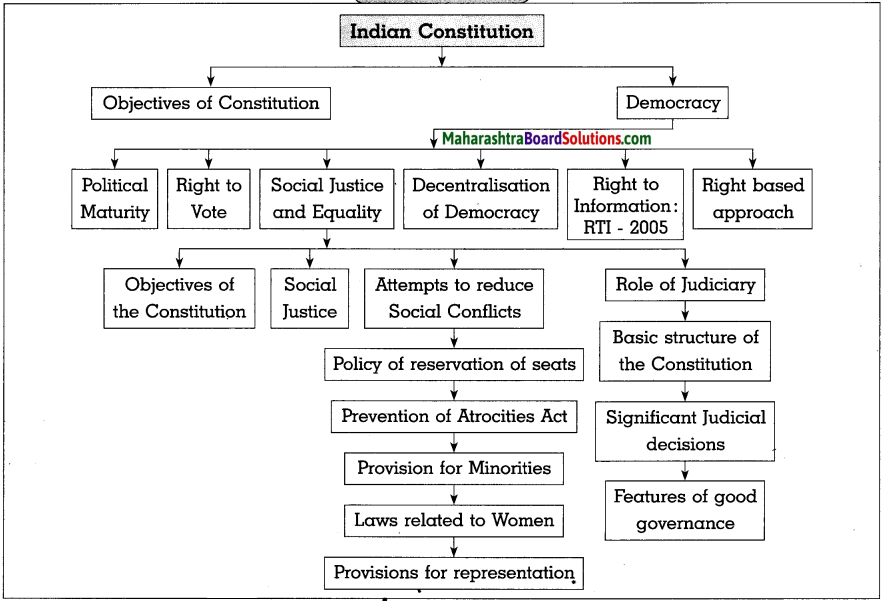
Q. Complete the sentences by choosing the correct option:
1. Right to Information came into force from
(a) 2002
(b) 2004
(c) 2005
(d) 2006
Answer:
(c) 2005
2. The Indian government has been working in accordance with principle of the
(a) Parliament
(b) President
(c) Constitution
(d) Party
Answer:
(c) Constitution
3. Men and women above years of age can vote in India.
(a) 15
(b) 18
(c) 21
(d) 25
Answer:
(b) 18
4. can make amendments to the Constitution.
(a) President
(b) Prime Minister
(c) Council of Ministers
(d) Parliament
Answer:
(d) Parliament
![]()
5. got recognition because of 73rd and 74th Amendments to the Constitution.
(a) Parliament
(b) Local self-governing institutions
(c) Legislative council
(d) Cooperative societies
Answer:
(b) Local self- governing institutions
6. ………………….. has made the government more transparent.
(a) Equality
(b) Freedom
(c) Right to Information
(d) Social Justice
Answer:
(c) Right to Information
7. and are two features of good governance.
(a) Popular, populist
(b) Efficient, democratic
(c) Transparent, responsible
(d) Equality, decentralization
Answer:
(c) Transparency, responsible.
Q. State whether the following statements are true or false:
1. Indian democracy is evidently unsuccessful.
Answer:
The above statement is False.
- India has the largest number of voters as compared to any other democratic nation in the world.
- Free and fair elections which are held regularly is the key for successful democracy.
- Recurring elections have helped in understanding the political process. As the voting age was reduced from 21 to 18 years, the political participation has increased.
- Increasing participation of the people in the political process and political contest shows that Indian democracy is successful.
2. There is less friction in all inclusive democracy.
Answer:
The above statement is True.
- To establish social justice and equality is the aim of democracy. .
- If all the sections of society are given equal opportunities without any discrimination then all 8 components come into the main stream.
- In fact, democracy is the process of accommodating different sections of society which ultimately reduces the social conflict.
![]()
Q. Explain the following concepts:
1. Decentralisation:
Answer:
- Division of power within, a country is known as Decentralisation.
- Under dictatorship and military rule, the power is centred around one person or a group of individuals.
- But in democracy the power is divided among Centre, State and Local Self-governing institutions. Decentralisation is the core of democracy.
- Decentralisation can stop the misuse of power and facilitate common people to participate in democracy.
2. Provisions regarding Minorities:
Answer:
- Constitution has adopted several measures for the protection of the rights of minorities.
- Several policies have been adopted by the government to provide them the opportunities in education and employment.
- The Constitution has prohibited any form of discrimination on the basis of caste, creed, religion, language and region.
- The Constitution provided rights to the minorities to protect and conserve their language, culture and establish educational institutions
3. Policy of Reservation of Seats:
Answer:
- Some sections of Indian society were denied social justice.
- They were deprived of educational and employment opportunities. It was essential to bring them in the main stream of society.
- The policy was adopted to give reservation to Scheduled Castes and Scheduled Tribes in educational institutions and public employment.
- Seats were also reserved for Other Backward Classes. Reservation policy gave the deprived classes justice and opportunities for development.
Q. Complete the Concept Map:
1. Complete the Concept Map:
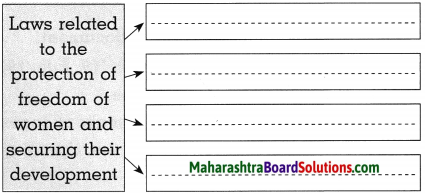
Answer:
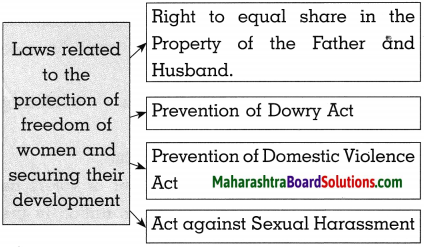
![]()
2. important to understand:
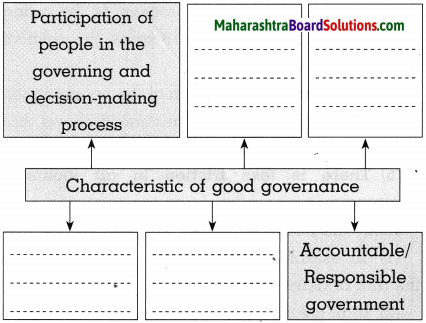
Answer:
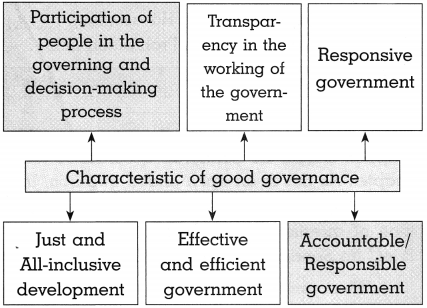
3. please understand:
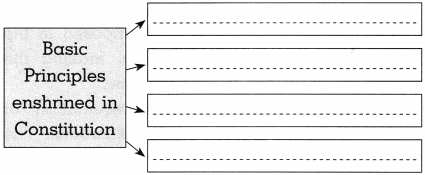
Answer:
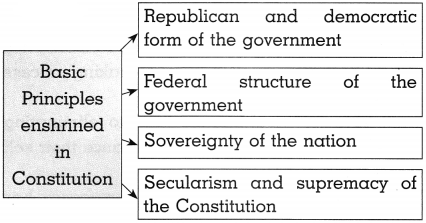
Q. Answer the following questions in brief:
1. What are the provisions made in the Directive Principles regarding decentralization?
Answer:
The Directive Principles of the Indian Constitution has made provisions for decentralization of power. It means:
- Indian Constitution has divided the power between the centre, state and local self-governing institutions.
- The guidelines about empowering the local self-governing bodies are given in the Constitution.
- After independence, 73rd and 74th Amendment to the Constitution in 1992 has given constitutional status to the local self-governing bodies.
- Due to this, there is increase in the participation by the people at grass root level. Democracy was put into practice which eventually got strengthened. Decentralisation curbed the misuse of power.
![]()
2. What were the measures taken to increase the number of women in politics?
Answer:
- The 73rd and 74th Constitutional Amendment provided reservation of 33% seats for women in local self governing institutions.
- This reservation has been increased to 50% in Maharashtra and many other states.
- One-third seats and the offices (posts) of Sarpanch, Mayor, etc. are reserved for women. Several policies have been adopted to remove illiteracy among women and to make available opportunities for their development.
- A bill is tabled in the house to reserve 50% seats in Legislative Assembly and Parliament.
3. The Judiciary in India has played an important role in strengthening democracy. Explain.
Answer:
- The Judiciary has always taken into consideration the fundamental objectives of the Constitution and also the intention of its framers.
- While interpreting the Constitution, it has taken care that its basic structure is not altered as Constitution is foundation of our democracy.
- The important role played by judiciary is in strengthening and helping democracy to achieve the objectives of social justice and equality.
4. Which particular Laws/Acts created a favourable environment for the protection of freedom of women and secure their development?
Answer:
- Several policies have been adopted in the post-independence period for empowering women.
- Provisions were made in the Constitution to provide opportunities for progress.
- Many laws were passed to empower them. They are:
- Right to have equal share in the property of father and husband.
- Dowry Prohibition Act.
- Act against Sexual Harassment.
- Domestic Violence Prohibition Act.
Q. Give your opinion:
1. What measures should be adopted to increase the number of women in representative democracy?
Answer:
Several restrictions were imposed in the name of traditions and practices, making’ the workspace of women limited to home.
- To curb injustice the representation of women should increase in all institutions. The 73rd and 74th Amendment reserved 33% of seats for women in local self governing institutions.
- Access to more and more social and political fields should be made available for women. They should be involved in the decision-making process and work for their betterment.
- This would ultimately lead to eliminating injustice done to them and will enhance their self respect and status.
![]()
2. Do you agree that Indian democracy has become profound?
Answer:
I entirely agree that Indian democracy has become profound.
- The Indian Constitution has laid down representative structure of democracy.
- The actual practice of the principles of democracy is the essence of representative system.
- People have direct representation in Lok Sabha, Rajya Sabha and Local Self-Government Institutions.
- Free and fair elections are held at regular intervals to elect representatives.
- Citizens cast their votes weighing the public issues and policies related to it. All the above factors show that Indian democracy has become profound.
3. Do you think that citizens in India should 8 have the right to employment? (Discuss – Textbook page 70)
Answer:
I agree that all Indian citizens should get I employment.
- If they are deprived of employment opportunities their families would face hunger and starvation.
- Incident of crime will increase in society.
- Democracy will collapse leading to chaos.
- More and more employment opportunities S should be generated for their progress.
4. According to you, if everyone gets the right to shelter, how will it affect democracy in 8 India?
Answer:
- Food, clothing and shelter are the basic necessities of a man.
- Shelter is not only his necessity but also his right.
- A permanent need is to get settled in life. 8 If a man gets a home, a large part of his struggle 8 in life will come to an end.
- The financial burden will be low and he will x work with honesty and will contribute in nation’s X progress.
- Home for all creates a healthy society. It has an all-round social, economical and psychological effect to strengthen democracy and make it 8 profound.
5. What steps should be taken to stop injustice done to the Backward Classes? OR What efforts should be made to prevent x atrocities?
Answer:
The backward classes have suffered for thousands of years. I feel the following measures x will remove injustice done to the backward classes:
- Atrocities laws should be made stringent.
- Fast courts should be set up to handle such cases.
- Stringent punishment should be given if 8 found guilty.
- Efforts should be made to improve economic 8 status of the backward classes.
- The Government should make efforts to establish social justice and equality. .
6. What efforts should be made to bring in all the features of good governance in democracy?
Answer:
For the successful functioning of democracy, good governance is very essential.
- People should elect good and professional candidates.
- People should keep watch on the work done by them.
- Corrupt candidates should not be elected or re-elected.
- People should respond to various policies which are beneficial for society.
- People should pressurise the government to start various developmental policies for country’s progress.
![]()
Q. B Can you tell the reasons for the following changes?
1. Some seats were reserved for women to increase their participation in political process.
Answer:
- Women empowerment movement started after independence.
- All the countries in the world started increasing number of women representatives.
- The 73rd and 74th constitutional amendment reserved 33% seats for women in local self- governing institutions.
- Some seats are kept reserved for women to increase their participation in political process.
- Some seats are kept reserved for weaker sections of the society so that they can get a share in political power.
- The State Election Commission has been established. The 11th and 12th schedule was added to the constitution.
2. Some seats are kept reserved for weaker sections of the society so that they can get a share in political power.
Answer:
- The weaker sections suffered injustice for thousand of years.
- The opportunities of education and employment had been denied to them.
- In order to establish social justice and equality, reservations are now given to the weaker sections.
3. The State Election Commissions were set up.
Answer:
- Elections for the Parliament and State Assemblies are conducted by the National Election Commission.
- It was impossible to put upon the local self government bodies the responsibility of conducting elections. Hence the State Election Commissions were formed.
![]()
4. 11th and 12th Schedule was added to the Constitution.
Answer:
- The 11th schedule of Indian Constitution was added in 1992 by the 73rd Constitution Amendment Act. This schedule contains 29 subjects related to panchayat.
- The 74th Amendment to the Constitution added 12th schedule and covered 18 subjects related to the Municipalities.
- ”It gave constitutional status to Municipalities and Panchayats and aimed to strengthen rural and urban governments so that they can function efficiently.
10th Std Political Science Questions And Answers:
- Chapter 1 Working of the Constitution Class 10 Political Science Questions And Answers
- Chapter 2 The Electoral Process Class 10 Political Science Questions And Answers
- Chapter 3 Political Parties Class 10 Political Science Questions And Answers
- Chapter 4 Social and Political Movements Class 10 Political Science Questions And Answers
- Chapter 5 Challenges faced by Indian Democracy Class 10 Political Science Questions And Answers